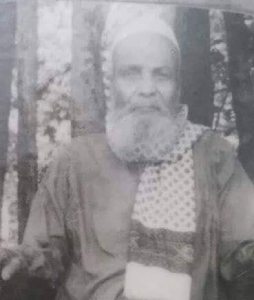Top Qs
Timeline
Chat
Perspective
Ibrahim Chatuli
Bangladeshi scholar, politician and social reformer From Wikipedia, the free encyclopedia
Remove ads
Ibrahim Ali Chatuli ( Arabic: إبراهيم على (جتولي); Bengali: ইব্রাহীম আলী চতুলী; 1894–1984) was a Bangladeshi Islamic scholar, politician and social reformer. He was the Education Minister of Assam Legislative Council,[1] and an elected Member of the Assam Legislative Assembly belonging to the Jamiat Ulema-e-Hind political party. His constituency joined the East Bengal Legislative Assembly after the Partition of India in 1947.[2][3][4]
Remove ads
Early life
Ibrahim Ali Chatuli was born in 1894, to a Bengali Muslim family in the village of Haratail in Barachatul Union, Kanaighat, Sylhet District. His father Munshi Abdul Karim was a scholar and poet. He studied at Jhingabari Alia Madrasa in Kanaighat, Ajiria Madrasa in Golapganj and Rampur Madrasa in India. He was a disciple of Hussain Ahmad Madani.[3][2]
Career
Ibrahim Chatuli was for a long time the Imam (prayer leader) and Khatib of Sylhet Nayasarak Jame Mosque. In 1938 he was elected a Member of the British Parliament from Jamiat Ulema-e-Hind. After that he was the Education Minister of Assam Provincial Council. During the 1946 Indian provincial elections, he was elected as a Member of the Assam Legislative Assembly (MLA) from Jamiat Ulema-e-Hind in the Sylhet Sadar-N constituency.[5][6] After the Sylhet referendum which incorporated the district into Pakistan, he became a member of the East Bengal Legislative Assembly.[4][7][8][9]
He was the general secretary of the then Ulema-e-Hind in the province of Assam, and a leader of the Indian independence movement.[3]
Remove ads
Death
Chatuli died in 1984.[3]
See also
References
Wikiwand - on
Seamless Wikipedia browsing. On steroids.
Remove ads

